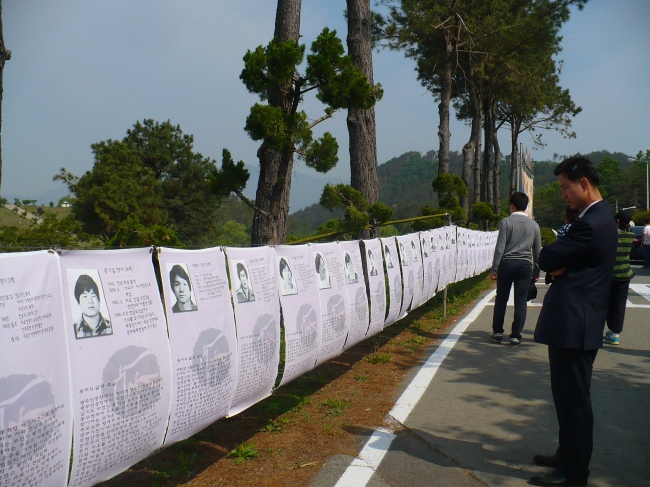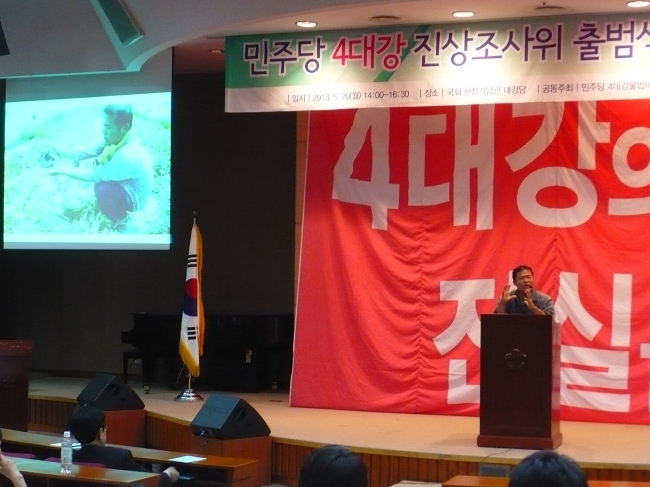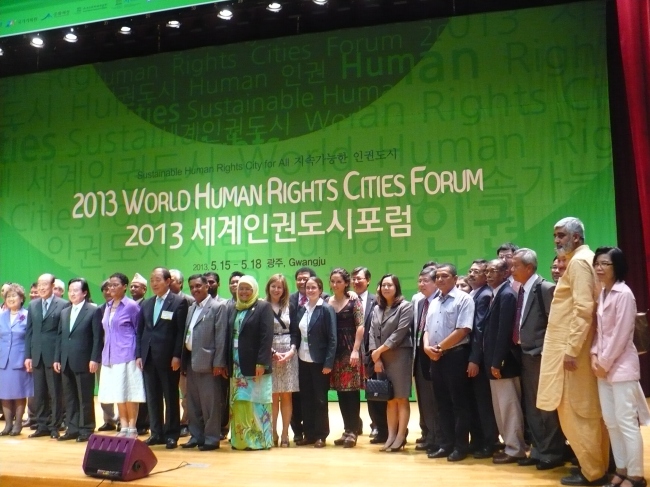A few weeks ago, Justiça Ambiental (JA!) was invited to make a presentation at the Human Rights Cities Forum in Gwangju, South Korea, by the Korean Federation of Environmental Movements (KFEM)/ Friends of the Earth Korea.
Gwangju city has historically been a symbol of democracy and Korean opposition to authoritarianism. In 1980, there was a huge uprising and peoples’ movement against the coup and dictatorship of General Chun Doo-Hwan. Gwangju citizens, especially students, rose up to oppose the fascist government. What followed was unmitigated violence from the army and the police, leading to the massacre of pro-democracy activists. Official sources of the dictatorship in 1980 put the total casualties at 144 civilians but the actual number may be between 1000 and 2000 deaths.
But the May 1980 protests in Gwangju slowly spread to other places and started to turn the tide against dictatorship. For the rest of the 1980s, Koreans continued to struggle for democracy and eventually ended authoritarian rule. To commemorate the strength of this powerful city, its citizens and its past, every year Gwangju city hosts this Human Rights Forum. The mayor of the city, Kan Un-tae, himself was present at the Forum.
The conference was held at the Kim Dae-Jung Convention Centre, named after Kim Dae-Jung, a politician from the Gwangju region who was one of the people arrested in the mobilisations. It is interesting to note that this region of South Korea is rich in natural resources, hence became a target for extraction and suppression of people.
JA was invited to speak on ‘environment and human rights’ and to share stories of the brutality of natural resource extraction in Mozambique. Prakash Sharma from Friends of the Earth Nepal also attended and spoke about climate change threats to the Himalayas and the Nepali people.
We also attended a prize ceremony where young people from across the world were awarded prizes for writing essays on human rights situations in their own cities and countries. Among the prize-winners was our neighbour, a young South African student called Zama Lehlogonolo.
After the end of the Forum, all the participants were taken to the main street where the Gwangju massacre had taken place in 1980. Gwangju citizens commemorated the occasion with a parade, celebrating Korean culture, dances, etc. The atmosphere was so positive. People remember the massacre but they use the memory to celebrate their lives instead.

The next day, we attended the May 18 ceremony at the cemetery where many of the massacred citizens were buried. There were speeches and Korean songs of protest. People lifted their fists the whole time the songs were being sung. It was very powerful.
Later that afternoon, our KFEM hosts took us back to Seoul city by train. The next day we spent a bit of time walking around and getting to know Seoul and its history. We saw Changdeok-gung Palace, quite a modest palace from the Joseon dynasty of Korea, from the time before the Japanese colonization of the Korean peninsula. We also saw a magnificent
Buddhist temple called Jogye-sa. Interestingly, about 22% of Koreans are Buddhist and 18% Christian but the biggest chunk, almost 50% are atheist.
On May 20, we meet the local staff of KFEM office. Then we went to the Congress building of Seoul city, to support a hearing of farmers and community members who were impacted by the 4 Rivers project. This is a project involving about 16 dams on 4 rivers, and has already caused destruction of livelihoods and ecology, so similar to the situation in Mozambique. There was also a photo exhibition showing the destruction caused by the project. Local farmers, activists, professors and Congressmen gave testimonials, following which the Congressmen from the progressive Democracy Party, and pledged to investigate the inconsistencies with the project. JA was also interviewed by Ohmynews, Korea’s largest online newspaper, about the reality of dams in Korea and Mozambique.

Later that evening, KFEM organised an open event with local citizens and students, called the ‘Glocal Talk Concert’, with an aim to raise Korean people’s international awareness. JA showed 2 short films, one on the situation of Vale-displaced communities in Cateme and the other with testimonials from Mphanda Nkuwa dam affected people.
All in all, JA’s experience in South Korea was phenomenal. It was wonderful to make international links on issues of extraction, environment and livelihoods. We were able to increase the visibility of Mozambique’s situation.

